salesforce.marketingcloud
Module salesforce.marketingcloud
API
Definitions
ballerinax/salesforce.marketingcloud Ballerina library
Overview
Salesforce Marketing Cloud is a leading digital marketing platform that enables businesses to manage and automate customer journeys, email campaigns, and personalized messaging.
The ballerinax/salesforce.marketingcloud package provides APIs to connect and interact with Salesforce Marketing Cloud API endpoints, supporting a wide range of marketing automation and journey management
Setup guide
This guide explains how to generate an access token in Salesforce Marketing Cloud using an Installed Package.
Step 1: Log in to Marketing Cloud
-
Navigate to your Salesforce Marketing Cloud login page and log in with your credentials.
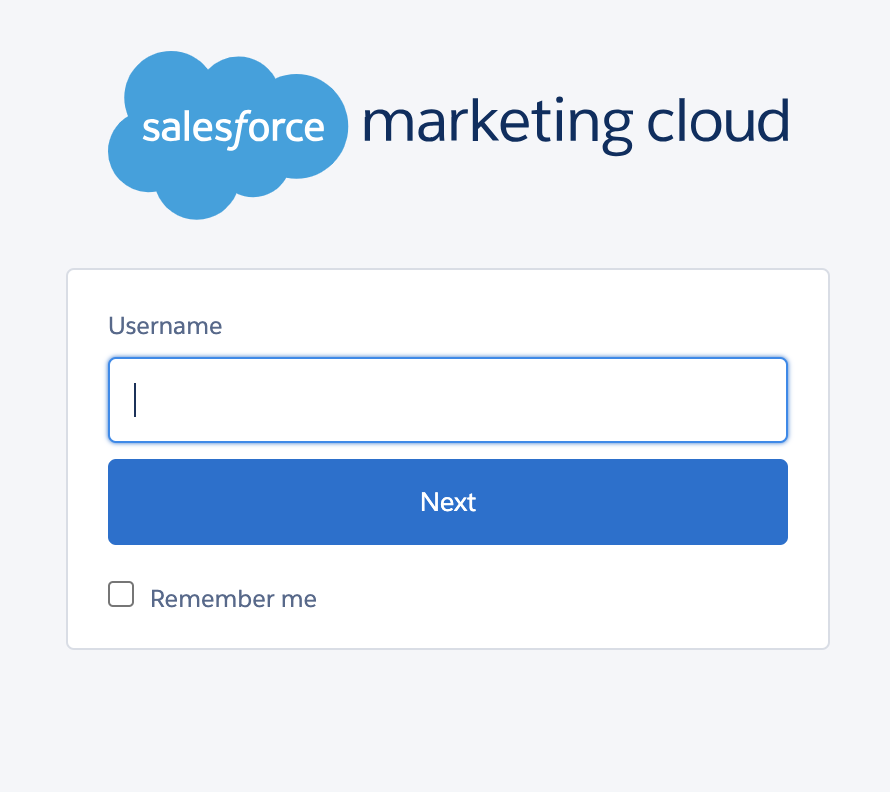
-
Once logged in, click on your username in the top right corner and select Setup from the dropdown menu.
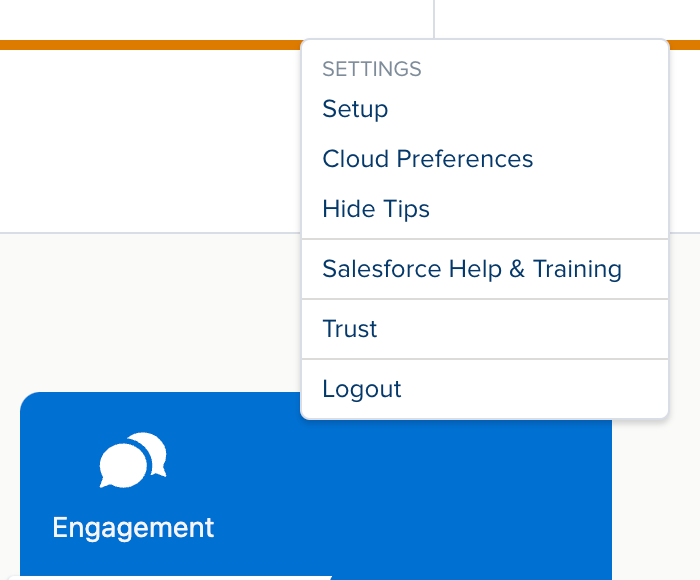
Step 2: Create an installed package
-
In the Setup menu, scroll down to the Platform Tools section.
-
Click on Apps and then select Installed Packages.
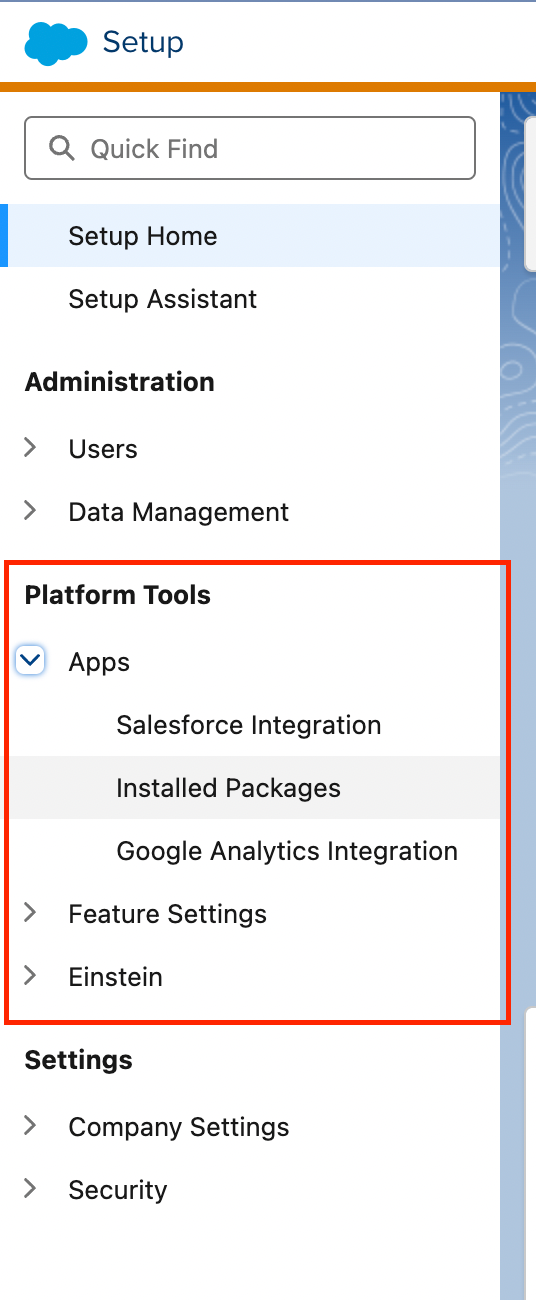
-
Click the New button.
-
Enter a Name and Description for your package (for example,
API Integration Package). -
Click Save.
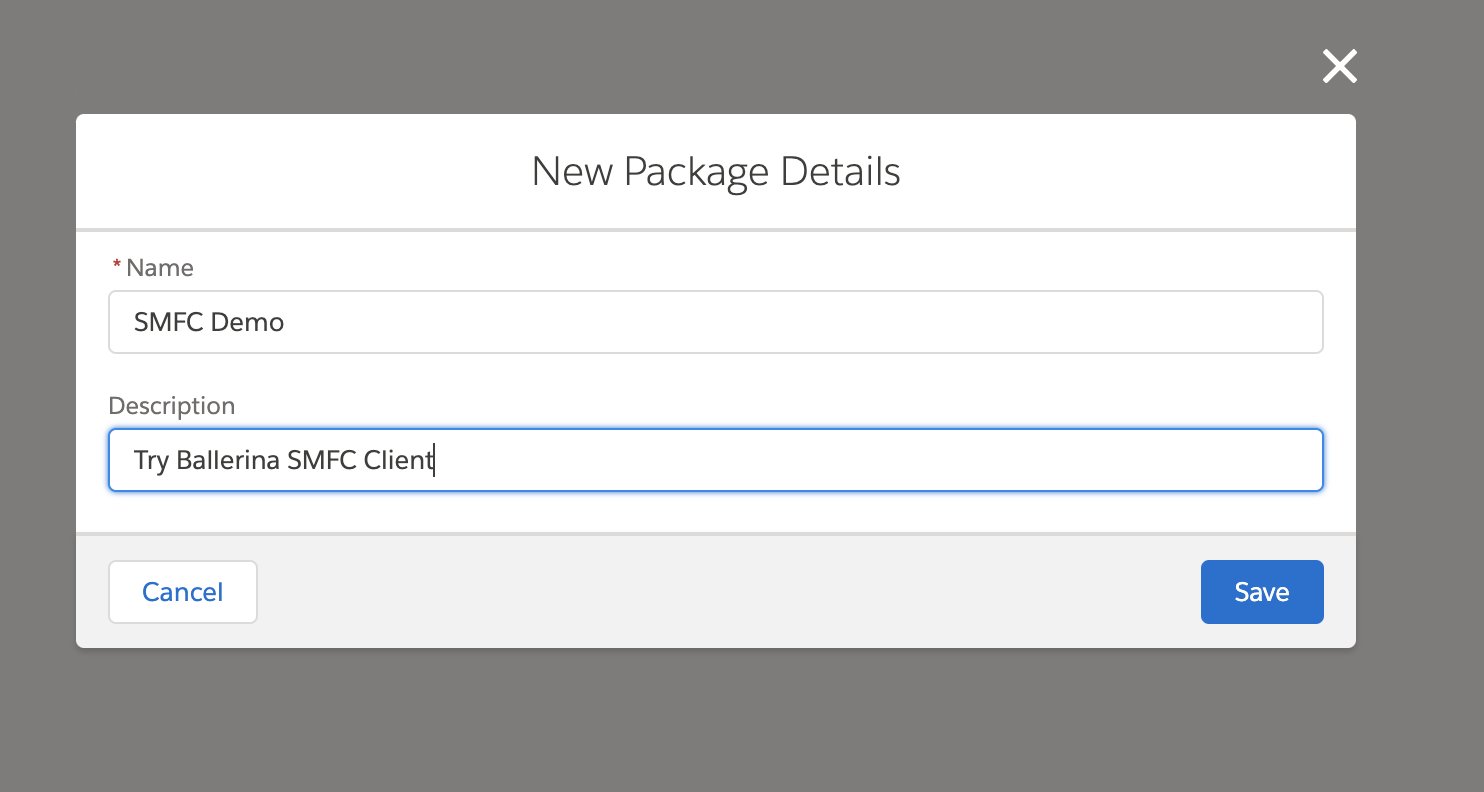
Step 3: Add an API integration component
-
After saving, click on the package you just created to view its details.
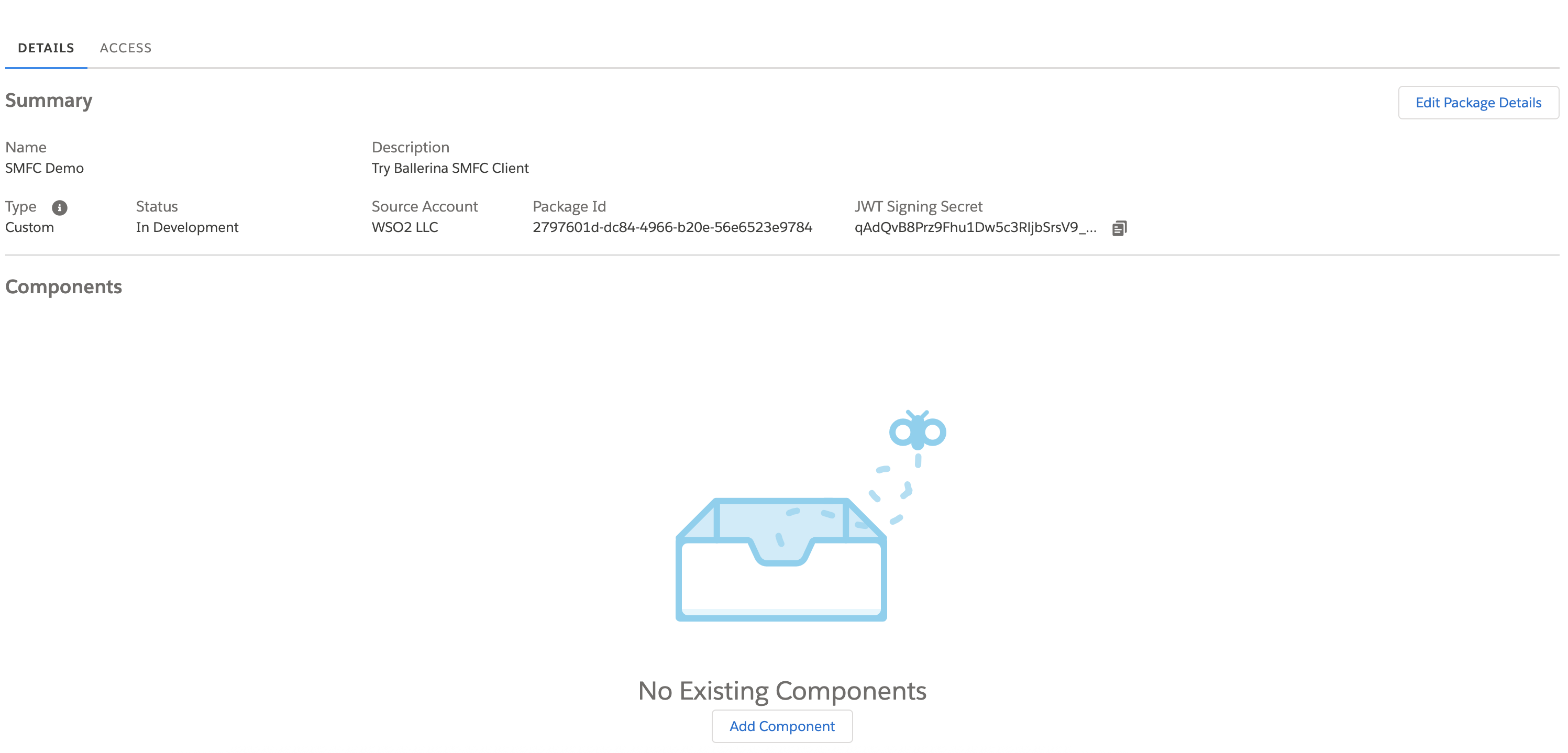
-
Click on Add Component.
-
Choose API Integration as the component type.

-
Select Server-to-Server as the integration type.

-
In the list of available scopes, check the required permissions for your integration. For most token generation and API calls, you might need:
- Read and Write access to Email Studio
- Access to the REST API
- Any additional scopes based on your specific use case
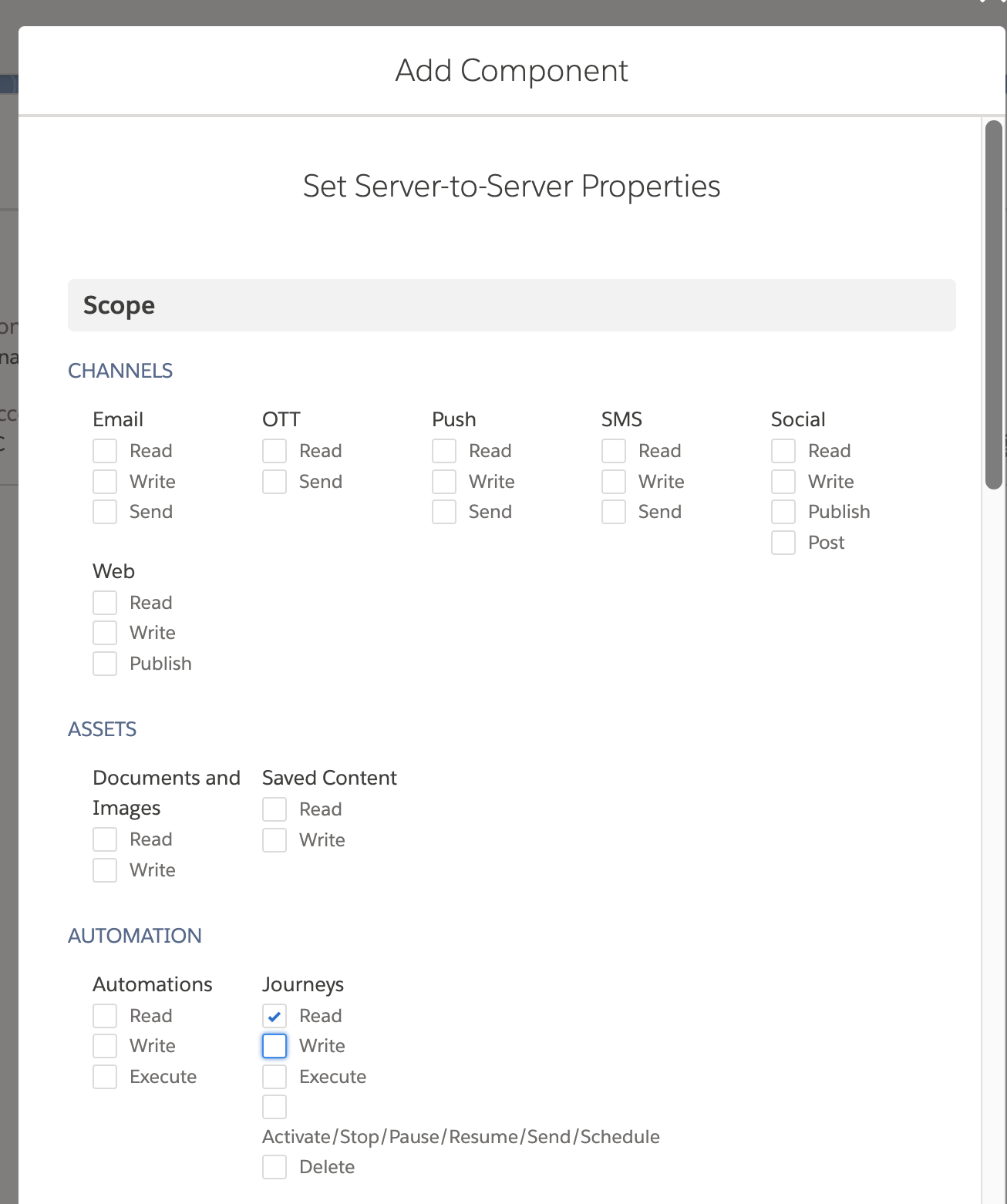
-
Click Save to add the component.
Step 4: Retrieve the Client ID and Client Secret
On the package detail page, note down the Base URIs, Client ID and Client Secret generated for your integration. These credentials are required to authenticate API calls. If necessary, click on Edit to update any integration details or to add further scopes.
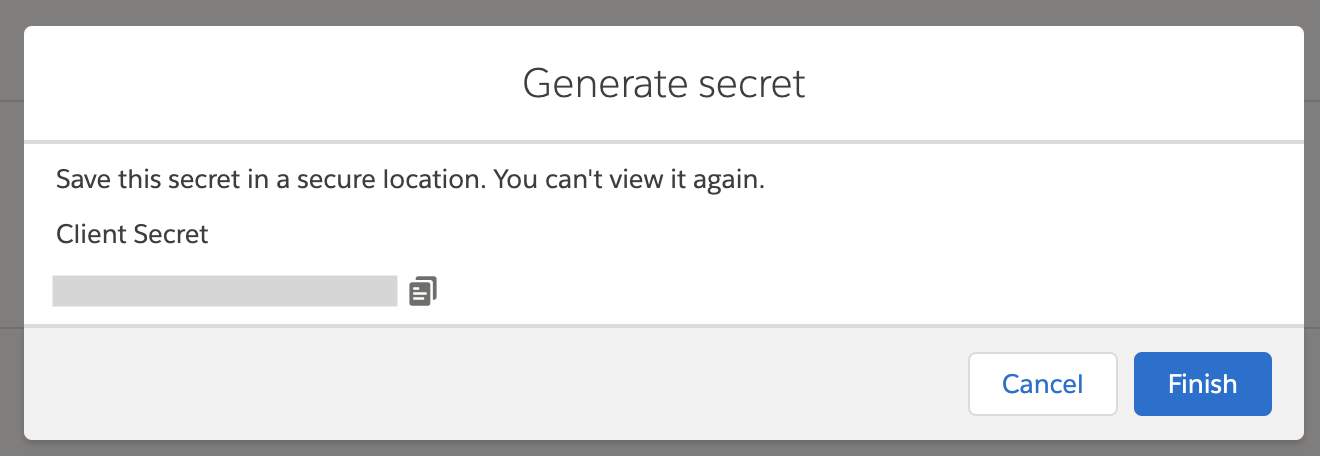
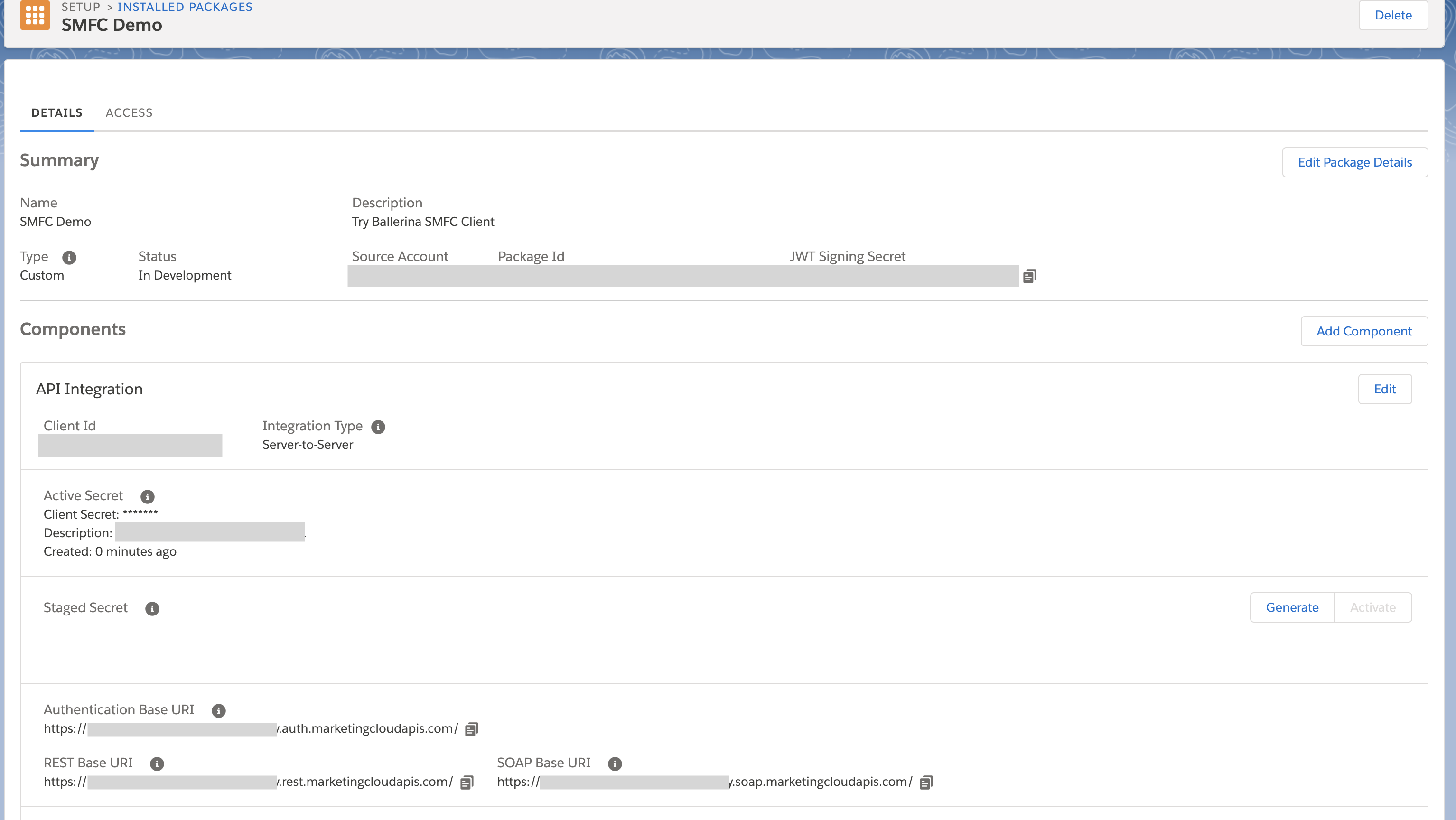
Step 5: Retrieve your user subdomain
Extract the subdomain by taking the portion between https:// and .auth.marketingcloudapis.com in your base URI. For example, from https://mc123456gkz1x4p5b9m4gzx5b9.auth.marketingcloudapis.com/, the subdomain is mc123456gkz1x4p5b9m4gzx5b9.
Step 6: Retrieve your account id if necessary
Navigate to the top right corner of your SFMC account interface, hover over your account name, and the MID will be displayed.
Note: This is only needed if the cloud account has more than one business units.
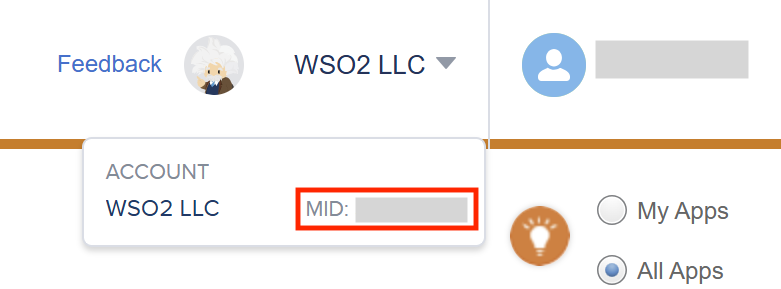
Quickstart
To use the salesforce.marketingcloud connector in your Ballerina application, modify the .bal file as follows:
Step 1: Import the module
Import the salesforce.marketingcloud module.
import ballerinax/salesforce.marketingcloud;
Step 2: Instantiate a new connector
Create a marketingcloud:ConnectionConfig with the obtained OAuth2.0 tokens and initialize the connector with it.
configurable string clientId = ?; configurable string clientSecret = ?; configurable string subDomain = ?; configurable string accountId = ?; marketingcloud:Client marketingCloudClient = check new ( subDomain, config = { auth: { clientId, clientSecret, accountId } } );
Step 3: Invoke the connector operation
Now, utilize the available connector operations.
See all the journeys contact is enrolled in
marketingcloud:ContactMembershipResponse res = check marketingCloudClient->getContactMembership({ contactKeyList: ["test@example.com"] });
Examples
The ballerinax/salesforce.marketingcloud connector provides practical examples illustrating usage in various scenarios. Explore these examples to understand how to capture and process database change events effectively.
- Seasonal Journey – Shows how to enroll new users into the Seasonal Journey by adding a row to a Data Extension, with checks to prevent enrolling users who are already part of the Rewin Journey.
Clients
salesforce.marketingcloud: Client
Salesforce Marketing Cloud APIs provide programmatic access to features such as Address, Assets (Content Builder), Audit, Contacts, Data Events, Event Notification, Interactions (Journey Builder), Push, SMS, Transactional Messaging, and Messaging. Refer to the official Salesforce documentation for detailed API usage and guidelines.
Constructor
Gets invoked to initialize the connector.
init (string subDomain, ConnectionConfig config)- subDomain string - Subdomain of the target service, e.g., 'mcdev' for 'mcdev.rest.marketingcloudapis.com'
- config ConnectionConfig - The configurations to be used when initializing the
connector
getEventDefinitions
function getEventDefinitions(map<string|string[]> headers, *GetEventDefinitionsQueries queries) returns EventDefinitionList|errorGet Event Definitions
Parameters
- queries *GetEventDefinitionsQueries - Queries to be sent with the request
Return Type
- EventDefinitionList|error - List of event definitions
createEventDefinition
function createEventDefinition(EventDefinition payload, map<string|string[]> headers) returns EventDefinition|errorCreate Event Definition
Parameters
- payload EventDefinition - Payload to be sent with the request
Return Type
- EventDefinition|error - Event Definition created successfully
getEventDefinitionByKey
function getEventDefinitionByKey(string eventDefinitionKey, map<string|string[]> headers) returns EventDefinition|errorGet Event Definitions - By Key
Parameters
- eventDefinitionKey string - Key of the event definition
Return Type
- EventDefinition|error - Event definition details
updateEventDefinitionByKey
function updateEventDefinitionByKey(string eventDefinitionKey, EventDefinition payload, map<string|string[]> headers) returns EventDefinition|errorUpdate Event Definition - By Key
Parameters
- eventDefinitionKey string - Key of the event definition
- payload EventDefinition - Payload to be sent with the request
Return Type
- EventDefinition|error - Successful response
deleteEventDefinitionByKey
function deleteEventDefinitionByKey(string eventDefinitionKey, map<string|string[]> headers) returns json|errorDelete Event Definition - By Key
Parameters
- eventDefinitionKey string - Key of the event definition
Return Type
- json|error - Successful response
updateEventDefinitionById
function updateEventDefinitionById(string eventDefinitionId, EventDefinition payload, map<string|string[]> headers) returns EventDefinition|errorUpdate Event Definition - By ID
Parameters
- eventDefinitionId string - ID of the event definition
- payload EventDefinition - Payload to be sent with the request
Return Type
- EventDefinition|error - Successful response
deleteEventDefinitionById
function deleteEventDefinitionById(string eventDefinitionId, map<string|string[]> headers) returns json|errorDelete Event Definition - By ID
Parameters
- eventDefinitionId string - ID of the event definition
Return Type
- json|error - Successful response
fireEntryEvent
function fireEntryEvent(FireEvent payload, map<string|string[]> headers) returns FireEventResponse|errorFire Entry Event
Parameters
- payload FireEvent - Payload to be sent with the request
Return Type
- FireEventResponse|error - Successful response
getJourneys
function getJourneys(map<string|string[]> headers, *GetJourneysQueries queries) returns JourneysList|errorGet Interactions (Journeys)
Parameters
- queries *GetJourneysQueries - Queries to be sent with the request
Return Type
- JourneysList|error - Successful response
updateJourney
Update an existing Journey version
Parameters
- payload UpdateJourney - Request body for updating an existing journey
createJourney
Create Interaction (Journey) - Simple Journey
Parameters
- payload Journey - Request body for creating a new journey
getContactMembership
function getContactMembership(ContactMembershipRequest payload, map<string|string[]> headers) returns ContactMembershipResponse|errorGet List Of Journeys Contact Is In
Parameters
- payload ContactMembershipRequest - Payload to be sent with the request
Return Type
- ContactMembershipResponse|error - Successful response with contact list memberships
removeContactFromJourney
function removeContactFromJourney(ContactExitRequest payload, map<string|string[]> headers) returns ContactExitResponse|errorRemove Contact From Journey
Parameters
- payload ContactExitRequest - Payload to be sent with the request
Return Type
- ContactExitResponse|error - Accepted – contact exit request successfully received
getContactExitStatus
function getContactExitStatus(ContactExitRequest payload, map<string|string[]> headers) returns ContactExitStatusResponse|errorGet Contact Journey Exit Status
Parameters
- payload ContactExitRequest - Payload to be sent with the request
Return Type
- ContactExitStatusResponse|error - Status of contact removal returned successfully
getJourneyById
function getJourneyById(string journeyId, map<string|string[]> headers, *GetJourneyByIdQueries queries) returns Journey|errorGet Interactions (Journeys) - By ID
Parameters
- journeyId string - ID of version 1 of the journey in the form of a GUID (UUID)
- queries *GetJourneyByIdQueries - Queries to be sent with the request
updateJourneyById
function updateJourneyById(string journeyId, UpdateJourney payload, map<string|string[]> headers) returns Journey|errorUpdate an existing Journey version
Parameters
- journeyId string - ID of the journey in the form of a GUID (UUID)
- payload UpdateJourney - Request body for updating an existing journey
deleteJourneyById
function deleteJourneyById(string journeyId, map<string|string[]> headers, *DeleteJourneyByIdQueries queries) returns json|errorDelete Interaction (Journey) - By ID
Parameters
- journeyId string - ID of the journey in the form of a GUID (UUID). The ID deletes all versions of the journey, unless a versionNumber is provided
- queries *DeleteJourneyByIdQueries - Queries to be sent with the request
Return Type
- json|error - Successful response
getJourneyByKey
function getJourneyByKey(string 'key, map<string|string[]> headers, *GetJourneyByKeyQueries queries) returns Journey|errorGet Interactions (Journeys) - By Key
Parameters
- 'key string - The key of the journey
- queries *GetJourneyByKeyQueries - Queries to be sent with the request
updateJourneyByKey
function updateJourneyByKey(string 'key, UpdateJourney payload, map<string|string[]> headers) returns Journey|errorUpdate existing Journey version
Parameters
- 'key string - The key of the journey
- payload UpdateJourney - Request body for updating an existing journey
deleteJourneyByKey
function deleteJourneyByKey(string 'key, map<string|string[]> headers, *DeleteJourneyByKeyQueries queries) returns json|errorDelete Interaction (Journey) - By Key
Parameters
- 'key string - Key of the journey. The Key deletes all versions of the journey, unless a versionNumber is provided
- queries *DeleteJourneyByKeyQueries - Queries to be sent with the request
Return Type
- json|error - Successful response
validateEmail
function validateEmail(ValidateEmailRequest payload, map<string|string[]> headers) returns ValidateEmailResponse|errorValidate Address
Parameters
- payload ValidateEmailRequest -
Return Type
- ValidateEmailResponse|error - Successful response
upsertDERowSetByKey
function upsertDERowSetByKey(string dEExternalKey, DataExtensionRowSet payload, map<string|string[]> headers) returns DataExtensionRowSet|errorUpsert Row Set - DE Key
Return Type
- DataExtensionRowSet|error - Successful response
Records
salesforce.marketingcloud: Activity
Represents a single activity in a journey
Fields
- id? string - The unique ID for the activity.
- 'key string - The unique customer key for the activity.
- name? string - The display name for this activity.
- 'type string - Defines the activity type. The expected input for each activity must be passed as an argument to operate correctly.
- outcomes? ActivityOutcomes[] - An array of outcome objects.
- arguments? record {} - An object that represents the arguments that the activity expects to be passed at runtime. Each activity type requires a different set of parameters.
- configurationArguments? record {} - An object that represents the arguments that the activity expects to be passed at publish and runtime. Each activity type requires a different set of parameters.
salesforce.marketingcloud: ActivityOutcomes
Fields
- 'key string - The unique customer key for the outcome.
- next string - A string that maps to a valid journey activity key.
salesforce.marketingcloud: ConnectionConfig
Provides a set of configurations for controlling the behaviours when communicating with a remote HTTP endpoint.
Fields
- auth OAuth2ClientCredentialsGrantConfig - Configurations related to client authentication
- httpVersion HttpVersion(default http:HTTP_2_0) - The HTTP version understood by the client
- http1Settings ClientHttp1Settings(default {}) - Configurations related to HTTP/1.x protocol
- http2Settings ClientHttp2Settings(default {}) - Configurations related to HTTP/2 protocol
- timeout decimal(default 30) - The maximum time to wait (in seconds) for a response before closing the connection
- forwarded string(default "disable") - The choice of setting
forwarded/x-forwardedheader
- followRedirects? FollowRedirects - Configurations associated with Redirection
- poolConfig? PoolConfiguration - Configurations associated with request pooling
- cache CacheConfig(default {}) - HTTP caching related configurations
- compression Compression(default http:COMPRESSION_AUTO) - Specifies the way of handling compression (
accept-encoding) header
- circuitBreaker? CircuitBreakerConfig - Configurations associated with the behaviour of the Circuit Breaker
- retryConfig? RetryConfig - Configurations associated with retrying
- cookieConfig? CookieConfig - Configurations associated with cookies
- responseLimits ResponseLimitConfigs(default {}) - Configurations associated with inbound response size limits
- secureSocket? ClientSecureSocket - SSL/TLS-related options
- proxy? ProxyConfig - Proxy server related options
- socketConfig ClientSocketConfig(default {}) - Provides settings related to client socket configuration
- validation boolean(default true) - Enables the inbound payload validation functionality which provided by the constraint package. Enabled by default
- laxDataBinding boolean(default true) - Enables relaxed data binding on the client side. When enabled,
nilvalues are treated as optional, and absent fields are handled asnilabletypes. Enabled by default.
salesforce.marketingcloud: ContactExitRequest
Fields
- versions? int[] - List of version numbers of the journey to remove contact from
- contactKey string - ID that uniquely identifies a subscriber or contact. Can be a single contact or an array of up to 50
- definitionKey string - Customer Key that uniquely identifies the journey
salesforce.marketingcloud: ContactExitResponse
Fields
- errors? ContactExitStatus[] -
salesforce.marketingcloud: ContactExitStatus
Fields
- contactKey? string -
- definitionKey? string -
- status? ContactExitStatusDetail[] -
salesforce.marketingcloud: ContactExitStatusDetail
Fields
- definitionInstanceId? string - The unique identifier for the journey instance from which the contact was removed
- message? string - A message providing additional information about the exit operation
- version? int - The version of the journey from which the contact was removed
salesforce.marketingcloud: ContactMembership
Fields
- contactMemberships? ContactMembershipDetail[] -
- contactsNotFound? string[] -
salesforce.marketingcloud: ContactMembershipDetail
Fields
- contactKey? string -
- definitionKey? string -
- version? int -
salesforce.marketingcloud: ContactMembershipRequest
Fields
- contactKeyList? string[] - The list of unique keys that identify the contacts
salesforce.marketingcloud: ContactMembershipResponse
Fields
- results? ContactMembership -
salesforce.marketingcloud: DataExtensionRow
Fields
- keys record {} - A map of key fields for the data extension row. The property names and types are arbitrary and depend on the data extension definition
- values record {} - A map of value fields for the data extension row. The property names and types are arbitrary and depend on the data extension definition
salesforce.marketingcloud: Defaults
An object that contains default values for the journey, such as email expressions. Example: { "email": ["{{Event.event-key.EmailAddress}}", "{{Contact.Default.Email}}"] }
Fields
- email? string[] - An ordered list of email expressions used to determine which email address to use as the default.
- string[]... - Rest field
salesforce.marketingcloud: DeleteJourneyByIdQueries
Represents the Queries record for the operation: deleteJourneyById
Fields
- versionNumber? int - Version number of the journey to delete. If no version is specified, ALL versions associated with the provided ID will be deleted
salesforce.marketingcloud: DeleteJourneyByKeyQueries
Represents the Queries record for the operation: deleteJourneyByKey
Fields
- versionNumber? int - Version number of the journey to delete. If no version is specified, ALL versions associated with the provided ID will be deleted
salesforce.marketingcloud: EventDefinition
Fields
- schema? record {} - Schema information for an event. The call uses this information to create a data extension associated with the Event Definition. Only required when not providing a dataExtensionId value
- sourceApplicationExtensionId? string - A link to the application extension that defines the configuration screens for this type. Journey Builder uses this ID to filter shared entry sources. For example, for the Event Definition to be visible in the Existing Entry sources panel in the UI, this field must be populated. To obtain this value, perform a GET eventDefinition on similar events in Journey Builder
- isVisibleInPicker? boolean - If true, makes this event visible in the Journey Builder Event Picker UI
- configuration? record {} - Optional configuration data for the event definition. Can include additional settings or parameters
- description? string - Optional description for the event definition, visible in UI
- 'type "Event"|"ContactEvent"|"DateEvent"|"RestEvent" - Type of the event definition (e.g., 'RestEvent')
- dataExtensionId? string - ID of the Data Extension used as the data source for the event. Optional if 'schema' is provided inline
- eventDefinitionKey string - Unique customer key for the event definition. Used to reference this event in API calls and journeys
- mode? "Production"|"Test" - Operation mode of the event definition. Can be 'Production' or 'Test'
- schedule? EventDefinitionSchedule - Optionally define a schedule for the event. Used to trigger the event on a recurring basis
- metaData? record {} - Optional metadata for the event definition. Can include additional information or settings
- name string - Display name for the event definition. Visible in Journey Builder UI
salesforce.marketingcloud: EventDefinitionList
Fields
- pageSize? int -
- page? int -
- items? EventDefinition[] -
salesforce.marketingcloud: EventDefinitionSchedule
Optionally define a schedule for the event. Used to trigger the event on a recurring basis
Fields
- StartDateTime string - The first time the scheduled automation should run.
- EndDateTime? string - The last time the scheduled automation should run. Required if EndType = EndDate.
- Occurrences? int - How many times the scheduled automation should run. Required if EndType = Occurrences.
- EndType "EndDate"|"Occurrences" - EndDate or Occurrences, indicates if automation schedule should stop after a specified date or a specified number of runs.
- Frequency "Minutely"|"Hourly"|"Daily"|"Weekly"|"Monthly"|"Yearly" - Minutely, Hourly, Daily, Weekly, Monthly, Yearly
- RecurrencePattern "Interval"|"EveryWeekDay"|"ByDay"|"ByWeek" - Interval - used by Minutely, Hourly, Daily; EveryWeekDay - used by Daily; ByDay - used by Weekly, Monthly, Yearly; ByWeek - used by Monthly, Yearly
- Interval? int - Used for Minutely, Hourly, Daily, Weekly, and Monthly schedules (not used for Yearly). Required if RecurrencePattern = Interval.
- Sunday? boolean - Only used for weekly schedules. May be null.
- Monday? boolean - Only used for weekly schedules. May be null.
- Tuesday? boolean - Only used for weekly schedules. May be null.
- Wednesday? boolean - Only used for weekly schedules. May be null.
- Thursday? boolean - Only used for weekly schedules. May be null.
- Friday? boolean - Only used for weekly schedules. May be null.
- Saturday? boolean - Only used for weekly schedules. May be null.
- ScheduledDay? int - Day of month (1 to 31), used for Monthly and Yearly schedules.
- ScheduledDayOfWeek? string - Name of day of week (Sunday), used for Monthly and Yearly schedules.
- ScheduledWeek? "First"|"Second"|"Third"|"Fourth"|"Last" - First, Second, Third, Fourth, Last, used for Monthly and Yearly schedules.
salesforce.marketingcloud: FireEvent
Fields
- eventDefinitionKey string - Key of the entry event defined in Journey Builder
- contactKey string - Unique identifier for the contact
- data? record {} - Additional attributes required by the entry event schema
salesforce.marketingcloud: FireEventResponse
Fields
- eventInstanceId? string - Unique ID for the fired event instance
salesforce.marketingcloud: GetEventDefinitionsQueries
Represents the Queries record for the operation: getEventDefinitions
Fields
- name? string - Filter event definitions by name substring
- page int(default 1) - The page number of results to retrieve. The default value is 1
- pageSize int(default 50) - The number of items to return on a page of results. The default and maximum value is 50
salesforce.marketingcloud: GetJourneyByIdQueries
Represents the Queries record for the operation: getJourneyById
Fields
- extras? Extras - A list of additional data to fetch. Available values are: all, activities, outcomes, and stats. Default is ''
- versionNumber? int - Version number of the journey to retrieve. If not provided, the latest version is returned
salesforce.marketingcloud: GetJourneyByKeyQueries
Represents the Queries record for the operation: getJourneyByKey
Fields
- extras? Extras - A list of additional data to fetch. Available values are: all, activities, outcomes, and stats. Default is ''
- versionNumber? int - Version number of the journey to retrieve. If not provided, the latest version is returned
salesforce.marketingcloud: GetJourneysQueries
Represents the Queries record for the operation: getJourneys
Fields
- mostRecentVersionOnly boolean(default true) - Use this parameter to specify whether to return the most recent version of each journey that matches the filter criteria. The default value is true
- specificApiVersionNumber decimal(default 1) - The version number of the workflowApiVersion value to retrieve. The default value is 1
- orderBy? string - The field and sort method to use to sort the results. You can sort on these fields: ModifiedDate, Name, Performance. You can sort these fields in ascending (ASC) or descending (DESC) order. The default value is modifiedDate DESC
- nameOrDescription? string - A search string to apply to the request. The API searches the name and description of each journey for this string, and returns all matching journeys
- extras? Extras - Additional information to include in the response. When you specify the all value for this parameter, the response includes a large amount of data. The volume of this data has a negative impact on the performance of this query
- tag? string - A tag to use to filter the results. When you specify this parameter, the API returns only journeys with the specified tag
- page int(default 1) - The page number of results to retrieve. The default value is 1
- pageSize int(default 50) - The number of items to return on a page of results. The default and maximum value is 50
- definitionType? "transactional" - The type of definition to retrieve. The only accepted value is transactional, which retrieves all transactional send definitions
- versionNumber? int - The version number of the journey to retrieve. The default value is the currently published version or the latest version number that meets the other search criteria
- status? JourneyStatus - A journey status value to use to filter the results. Possible values are: Deleted, Draft, Published, ScheduledToPublish, Stopped, Unpublished. The ScheduledToSend, Sent, and Stopped statuses exist only in single-send journeys. If you don't specify a status value, the API returns all journeys regardless of their statuses
salesforce.marketingcloud: Goal
Represents a goal in a journey
Fields
- 'key string - The customer key for this goal.
- name string - The display name for this goal.
- 'type? "ContactEvent" - The type of goal this is (only option currently is ContactEvent).
- description? string - The description for this goal, will be displayed in the Journey Builder user interface.
- metaData? record {} - A set of properties which are not specific to the definition or execution of this Event, but are related to it.
- conversionUnit? "percentage"|"wholenumber" - This value is used for deterministic evaluations of the goal, can be either 'percentage' or 'wholenumber'.
- conversionValue? decimal - Based on the conversionUnit this is the metric Journey Builder uses to determine if the goal has been satisfied.
salesforce.marketingcloud: Journey
Represents a complete journey definition
Fields
- id? string - A unique identifier for this journey (read-only).
- version? int - The iteration/version number of the journey (read-only).
- 'key string - The customer-defined unique key for this journey.
- name string - Display name of the journey in the UI.
- description? string - Human-readable explanation of the journey's purpose.
- workflowApiVersion decimal - Version of the Journey Spec used.
- goals? Goal[] - An array of goals containing a single object. Journeys only support one goal.
- triggers? EventDefinition[] - An array of triggers containing a single object. Journeys only support one trigger.
- defaults? Defaults - An object that contains default values for the journey, such as email expressions. Example: { "email": ["{{Event.event-key.EmailAddress}}", "{{Contact.Default.Email}}"] }
- activities? Activity[] - An array that includes all the activities of the journey.
salesforce.marketingcloud: JourneysList
Response containing a collection of journeys
Fields
- count int - Total number of journeys returned in this page
- items Journey[] - Array of journey definitions
- page int - Current page number
- pageSize int - Total number of available pages
salesforce.marketingcloud: OAuth2ClientCredentialsGrantConfig
OAuth2 Client Credentials Grant Configs
Fields
- tokenUrl? never - Token url should not be provided
- credentialBearer CredentialBearer(default oauth2:POST_BODY_BEARER) - Credential Bearer type to use for the request
- accountId? string - The member ID (MID) of your Marketing Cloud account
salesforce.marketingcloud: UpdateJourney
Request body for updating an existing journey
Fields
- id? string - Journey UUID (optional if key is provided)
- 'key string - Customer-defined journey key
- name string - Journey display name
- description? string - Journey description (optional)
- version int - Version number to update
- workflowApiVersion float - Journey spec version (0.5 or 1.0)
- modifiedDate string - Current modifiedDate, required to prevent concurrent writes
- entryMode? string - Entry mode (e.g., APIEvent, Scheduled)
- entryEvent? EventDefinition -
- goals? Goal[] - Goals that define journey completion or exit criteria
- activities? Activity[] - Activities that define the steps in the journey
salesforce.marketingcloud: ValidateEmailRequest
Fields
- validators ("SyntaxValidator"|"MXValidator"|"ListDetectiveValidator")[] - List of validators to apply to the email address
- email string - Email address to validate
salesforce.marketingcloud: ValidateEmailResponse
Fields
- valid? boolean - Indicates whether the email address is valid
- failedValidation? string - The validator that failed, if any
- email? string - The email address that was validated
Union types
salesforce.marketingcloud: Extras
Extras
Extras to include. Values:
- all: Fetch all extras
- activities: Include journey activities
- outcomes: Include journey outcomes
- stats: Include journey statistics
- '': No extras (default)
salesforce.marketingcloud: JourneyStatus
JourneyStatus
A journey status value to use to filter the results. The ScheduledToSend, Sent, and Stopped statuses exist only in single-send journeys. If you don't specify a status value, the API returns all journeys regardless of their statuses
Array types
salesforce.marketingcloud: DataExtensionRowSet
DataExtensionRowSet
An array of data extension rows to be upserted
Simple name reference types
salesforce.marketingcloud: ContactExitStatusResponse
ContactExitStatusResponse
Import
import ballerinax/salesforce.marketingcloud;Other versions
0.1.0
Metadata
Released date: 4 months ago
Version: 0.1.0
License: Apache-2.0
Compatibility
Platform: any
Ballerina version: 2201.12.0
GraalVM compatible: Yes
Pull count
Total: 0
Current verison: 0
Weekly downloads
Keywords
marketing
sales
communication
Contributors